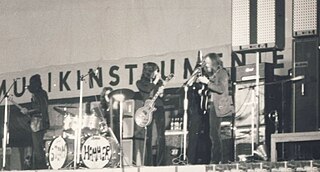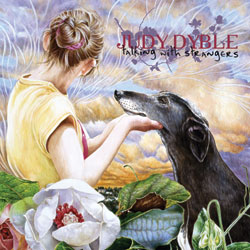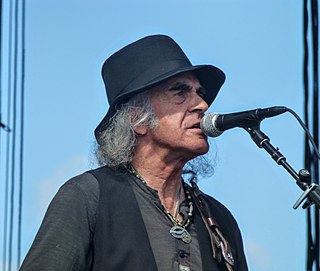Related Research Articles

Robert Fripp is an English musician, songwriter, record producer, and author, best known as the guitarist, founder and longest-lasting member of the progressive rock band King Crimson. He has worked extensively as a session musician and collaborator, notably with David Bowie, Blondie, Brian Eno, Peter Gabriel, Daryl Hall, the Roches, Talking Heads, and David Sylvian. He also composed the startup sound of Windows Vista, in collaboration with Tucker Martine and Steve Ball. His discography includes contributions to more than 700 official releases.

Fairport Convention are an English folk rock band, formed in 1967 by guitarists Richard Thompson and Simon Nicol, bassist Ashley Hutchings and drummer Shaun Frater. They started out influenced by American folk rock, with a set list dominated by Bob Dylan and Joni Mitchell songs and a sound that earned them the nickname "the British Jefferson Airplane". Vocalists Judy Dyble and Iain Matthews joined them before the recording of their self-titled debut in 1968; afterwards, Dyble was replaced by Sandy Denny, and Matthews later left during the recording of their third album.

Dave Pegg is an English multi-instrumentalist and record producer, primarily a bass guitarist. He is the longest-serving member of the British folk rock band Fairport Convention and has been bassist with a number of folk and rock groups including the Ian Campbell Folk Group and Jethro Tull.

A Young Person's Guide to King Crimson is a 2-LP compilation album by the band King Crimson, released in 1976. At the time of release, the band had been disbanded. Guitarist Robert Fripp selected the tracks for inclusion.

Ian Richard McDonald was an English musician, composer and multi-instrumentalist, best known as a founding member of the progressive rock band King Crimson in 1968, as well as the hard rock band Foreigner in 1976.
Giles, Giles and Fripp were an English rock group, formed in Bournemouth, Dorset in August 1967. It featured brothers Michael Giles on drums and vocals and Peter Giles on bass guitar and vocals, and Robert Fripp on guitar. The band's music showed an eclectic mix of pop, psychedelic rock, folk, jazz, and classical influences. The group eventually evolved into pioneering progressive rock band King Crimson.
Peter Giles is a British singer and bassist. He is the brother of drummer Michael Giles.

Simon John Breckenridge Nicol is an English guitarist, singer, multi-instrumentalist and record producer. He was a founding member of British folk rock group Fairport Convention and is the only founding member still in the band. He has also been involved with the Albion Band and a wide range of musical projects, both as a collaborator, producer and as a solo artist. He has received several awards for his work and career.

Fairport Convention is the debut studio album by the English folk rock band Fairport Convention. The band formed in 1967, with the original line-up consisting of Richard Thompson (guitar); Simon Nicol (guitar); Ashley “Tyger” Hutchings (bass); and Shaun Frater (drums), who was replaced after their first gig by Martin Lamble. They were joined by Judy Dyble (vocals), and Ian MacDonald after they made their major London stage debut in one of Brian Epstein’s Sunday concerts at the Saville Theatre.

Steamhammer are an rock band from Worthing, England, formed in 1968 by vocalist Kieran White, guitarists Martin Quittenton and Martin Pugh, bassist Steve Davy, and drummer Michael Rushton.

Judith Aileen Dyble was an English singer-songwriter, most notable for being a vocalist and a founding member of Fairport Convention and Trader Horne. In addition, she and Ian McDonald joined and recorded several tracks with Giles, Giles and Fripp, who later became King Crimson. These tracks surfaced on the Brondesbury Tapes CD and Metaphormosis vinyl LP.

Steamhammer was the debut album by the British rock band Steamhammer, issued in March 1969. Steamhammer was American blues guitarist Freddy King's backing band whenever he toured England. The musicians in the band were Martin Quittenton (guitar), Kieran White, Martin Pugh (guitar), Steve Davy (bass), and Michael Rushton (drums). The album includes classic blues numbers by B.B. King and Eddie Boyd, as well as compositions by band members White, Quittenton, and Pugh. The session musicians Harold McNair (flute) and Pete Sears (piano) also appear on the album.
Martin Quittenton was a British guitarist and composer. He played in the blues rock band Steamhammer, formed in 1968. Their debut album Steamhammer was released in 1969.

Talking with Strangers is an album first issued in the UK in 2009, by Judy Dyble featuring Robert Fripp, Ian McDonald, Julianne Regan, Simon Nicol, Tim Bowness, Jacqui McShee, Pat Mastelotto, Alistair Murphy, Celia Humphris, Laurie A'Court, Rachel Hall, Mark Fletcher, Jeremy Salmon, Paul Robinson, John Gillies, Sanchia Pattinson and Harry Fletcher.
Bruce Rowland was an English rock drummer best known for his memberships of The Grease Band and folk rock band Fairport Convention. He was also a prolific session musician.

Peter Roy Sears is an English rock musician. In a career spanning more than six decades, he has been a member of many bands and has moved through a variety of musical genres, from early R&B, psychedelic improvisational rock of the 1960s, folk, country music, arena rock in the 1970s, and blues. He usually plays bass, keyboards, or both in bands.

Morning Way is a 1970 album by Trader Horne. It was released by Pye Records in 1970. The album was the only release by Trader Horne and sold limited numbers at the time. The album was re-released on CD in 2008 by Esoteric Records. Through the years this LP has reached legendary status and it is considered one of the lost gems of the 1960s..
"I Talk to the Wind" is the second track from the British progressive rock band King Crimson's debut album, In the Court of the Crimson King (1969).

Jackie McAuley is a Northern Irish guitarist and keyboard player, known particularly for his work with the bands Them and Trader Horne.
References
This article shares its genesis with material in the public-domain source on Judy Dyble's website (see 'External links' below).
- ↑ "Giles, Giles & Fripp feat Judy Dyble I Talk To The Wind". YouTube. 26 February 2009. Retrieved 17 August 2009.
- ↑ Barroso, Koldo (March 2007). "Interview with Judy Dyble of Fairport Convention". The Marquee Club. Archived from the original on 5 July 2008. Retrieved 17 August 2009.
I put an advertisement in the Melody Maker looking for musicians to join my (virtually non existent) band and Peter Giles answered it